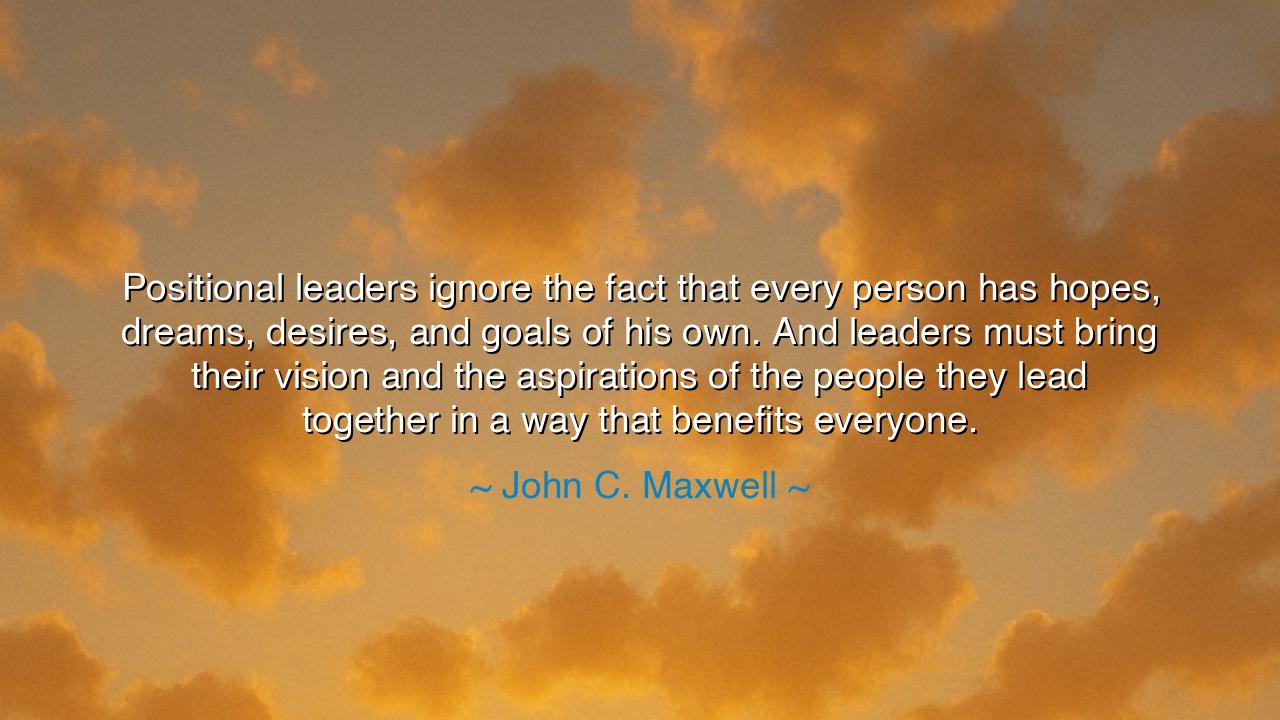
Positional leaders ignore the fact that every person has hopes
Positional leaders ignore the fact that every person has hopes, dreams, desires, and goals of his own. And leaders must bring their vision and the aspirations of the people they lead together in a way that benefits everyone.






In the timeless and compassionate words of John C. Maxwell, master teacher of leadership and human purpose, we are reminded of a truth that transcends rank and age: “Positional leaders ignore the fact that every person has hopes, dreams, desires, and goals of his own. And leaders must bring their vision and the aspirations of the people they lead together in a way that benefits everyone.” These words are not merely counsel for those who command armies or corporations — they are a mirror held up to the soul of leadership itself. For true leadership, Maxwell teaches, does not rest upon title or authority, but upon understanding, upon the sacred art of weaving one’s own purpose with that of others, until a shared vision shines forth like a guiding flame.
The origin of this quote lies in Maxwell’s lifelong study of leadership not as domination, but as service. In his works, especially The 5 Levels of Leadership, he distinguishes between positional leaders — those who rely upon status and title — and relational leaders, who earn trust and loyalty through empathy and shared vision. A positional leader says, “Follow me because I am in charge.” A true leader says, “Walk with me, for together we will become greater.” Maxwell’s wisdom arose not from theory alone, but from decades of mentoring and observing how the most successful and beloved leaders are those who see people as souls, not tools — who understand that within every follower burns a small fire of longing, waiting for someone to believe in it.
To ignore the hopes and dreams of others is to lead in blindness. It is to walk ahead while leaving one’s people behind in shadow. Maxwell warns that such leaders may command obedience, but they will never command hearts. The positional leader believes leadership is about power; the transformational leader knows it is about purpose. The former builds walls of authority; the latter builds bridges of vision. Only by listening, by recognizing that each person carries a dream of their own, can a leader truly unite many lives into one shared destiny.
History itself bears witness to this truth. Consider the story of Abraham Lincoln, who in the darkest years of the American Civil War refused to rule with arrogance or fear. Instead, he sought to understand both his allies and his enemies, binding together the aspirations of a divided nation into a single, higher cause — freedom and unity. Lincoln did not see himself merely as President; he saw himself as servant of a people’s dream. His leadership was not positional but personal — rooted in compassion, in humility, and in the conviction that every man’s heart deserved to be heard. Through such empathy, he transformed not only a country but the very meaning of leadership.
Maxwell’s teaching also carries a subtle but profound challenge. To bring one’s vision and the people’s aspirations together requires not only compassion, but courage. It demands that the leader listen deeply, even when the truth is uncomfortable. It requires patience to understand the silent hopes of the humble, and wisdom to align those hopes with the greater mission. The weak leader demands loyalty; the wise leader inspires it. The weak leader says, “Serve my dream.” The wise leader says, “Let us build your dream within mine.” And in that merging of purpose, power ceases to be selfish — it becomes sacred.
This teaching extends beyond politics or business; it belongs to all who guide others — parents, teachers, mentors, and friends. In every community and home, there are those who lead by position and those who lead by heart. A parent who demands obedience but ignores the child’s dream may control, but not inspire. A teacher who teaches facts but not faith in one’s potential may educate, but not awaken. Maxwell calls all such souls to a higher path — one where leadership is love in motion, where the success of the leader is measured not by how high he climbs, but by how many rise with him.
Therefore, O seeker of wisdom, take this teaching into your life: lead not from authority, but from understanding. When you guide others, do not look upon them as instruments of your vision, but as companions in the creation of a greater dream. Listen to their desires, honor their gifts, and weave their hopes into your purpose. In this way, your leadership will not end when your title fades, for you will have awakened something eternal — the belief in the hearts of others that their dreams matter.
And remember always the heart of Maxwell’s wisdom: a leader’s greatness lies not in commanding others to follow, but in lifting others to dream beside him. When vision and compassion meet, when power and purpose walk hand in hand, then leadership becomes more than influence — it becomes legacy, and its light continues to guide long after the leader himself has passed into memory.






AAdministratorAdministrator
Welcome, honored guests. Please leave a comment, we will respond soon